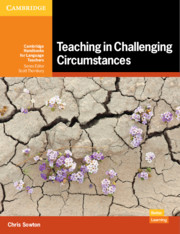Book contents
- Frontmatter
- Contents
- Thanks
- Acknowledgements
- Introduction
- I Creating a good environment for language learning
- II Being effective in the classroom
- III Teaching large classes
- IV Teaching language skills and systems
- V Teaching language without textbooks
- VI Teaching language with textbooks
- VII Helping students achieve their potential
- VIII Linking the school to the outside world
- IX Supporting yourself and others
- Glossary
- Index
32 - Accessing development opportunities
Published online by Cambridge University Press: 22 September 2021
- Frontmatter
- Contents
- Thanks
- Acknowledgements
- Introduction
- I Creating a good environment for language learning
- II Being effective in the classroom
- III Teaching large classes
- IV Teaching language skills and systems
- V Teaching language without textbooks
- VI Teaching language with textbooks
- VII Helping students achieve their potential
- VIII Linking the school to the outside world
- IX Supporting yourself and others
- Glossary
- Index
Summary
A journey of a thousand miles begins with a single step.
Chinese proverb, attributed to Lao TzuThe short version
1 It's important to develop as a teacher, for personal, professional and psychological reasons.
2 Although you may feel that you have no opportunities for professional development, even in the most challenging circumstances, there are things you can do.
3 Developing your language ability, particularly your spoken skills, can give you confidence and have a positive impact on your teaching ability.
4 Participating in face-to-face and/or online teacher groups, as well as joining national or international networks, is a good way of developing your pedagogical skills and to make you feel part of a community.
5 There are many online options for development, but you may need to search carefully to find ones which are relevant and appropriate for you.
Introduction
1 What skills and knowledge would make you a better teacher?
2 What development opportunities can you find in your context? Are you accessing all the opportunities which are available?
Teacher development
Developing as a teacher is important for personal, professional and psychological reasons. In becoming better as a teacher, as learning experiences and outcomes improve, both you and your students benefit. Furthermore, as you develop your own skills and abilities, you also make yourself more employable. Teachers, like students, can sometimes have a negative mindset, where professional development feels pointless, or a very high mountain to climb. You may feel that there is so much to do that there is no point in doing anything, However, in the majority of challenging circumstances, if teachers don't take responsibility for their own development, nobody else will. Although it may not be easy, it is usually possible to improve your situation.
Teacher development can be divided into three main categories:
• How can I increase my knowledge of my specific subject area? (e.g. improving your own English, or a specific aspect of it, such as speaking skills)
• How can I improve my general pedagogic skills? (e.g. using group work more effectively, or teaching writing more collaboratively)
• How can I improve a specific skill which is particularly relevant where I teach? (e.g. supporting children who have trauma, or teaching multilingual classes)
- Type
- Chapter
- Information
- Teaching in Challenging Circumstances , pp. 186 - 189Publisher: Cambridge University PressPrint publication year: 2021



